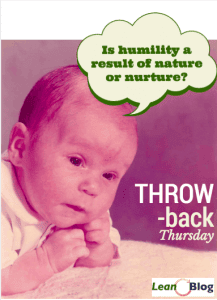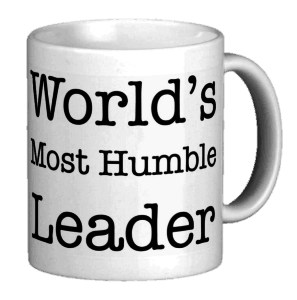
Today's post is a Throwback Thursday look back at a blog post from 2014 on humility: “The Leadership Pond Usually Isn't Stocked with Humble Fish.”
I recently re-read parts of the book that inspired the post, Toyota by Toyota: Reflections from the Inside Leaders on the Techniques That Revolutionized the Industry.
It's an outstanding book that I recommend to people every chance I get.
As I mentioned in last year's post, chapter 1 emphasizes humility quite a bit, as you see in the title of chapter 1.

The author of the chapter, Darril Wilburn, writes about the need to have humility AND courage.
Hear Mark read the post (subscribe to the podcast series):
Darril points out it requires courage to point out a problem and humility to “deeply understand the current situation.”
Humility also means being willing to admit that there is a problem.
Humility means “we don't really know so we must understand and then try many things to see if we have the right solution.”
He summarizes his lessons learned beautifully:

I was reminded of these lessons recently, when I saw a wonderful passage in Dr. John Toussaint's most recent book, Management on the Mend.
He writes, of humility:
“…in humility there is great freedom. We can stop pretending to know everything.”
Re-tweet me if you want to share that quote further on Twitter.
I also shared the quote in my talk yesterday for the Leapfrog Group and it really resonated with folks:
There's such a focus on humility within the Toyota Production System and management style.
Humility means we shift from readily KNOWING the answer to being willing to FIND the answer through TESTING small changes. We might try something that doesn't work. Humility and the willingness to admit that is an important part of the Plan Do Study Adjust (PDSA) approach.
Otherwise, we just have Plan Do Confirm Rationalize if we can't ever ” be wrong.” Being wrong means we've learned something, if we're humble enough to admit that.

For all of the talk about Lean culture, I don't recall ever seeing any classes or workshops being offered on humility. Maybe it's a silly notion — can people actually learn how to be humble? Can a person become more humble, or is it one of those traits that's pretty well settled by the time we're adults?
Thankfully, nobody is offering certifications in humility or “humility belts” — and hopefully we never see anyone with this ironic coffee mug that I created.
I'd propose we need more humility. The stories contributed to the book “Practicing Lean” demonstrate humility in different ways and I admire everybody who has contributed (and will contribute).
I don't sit here claiming to be the most humble or that I have this all figured out. But my hypothesis, shared by others, is that more humility leads to more improvement in an organization.
If we need more humility… how do we get there?
What do you think? Please scroll down (or click) to post a comment. Or please share the post with your thoughts on LinkedIn – and follow me or connect with me there.
Did you like this post? Make sure you don't miss a post or podcast — Subscribe to get notified about posts via email daily or weekly.
Check out my latest book, The Mistakes That Make Us: Cultivating a Culture of Learning and Innovation:









